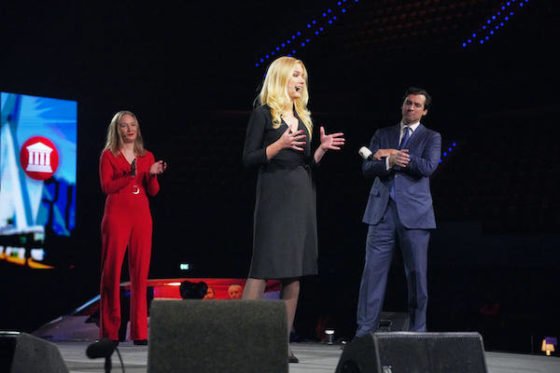Dutch activist Eva Vlaardingerbroek’s recent criticism of her government’s 10-year security deal with Ukraine has sparked controversy and drawn attention from various quarters. Vlaardingerbroek expressed her dismay over the agreement, claiming that the Dutch people were not consulted before committing to long-term financial and military support for Ukraine. Her sentiments were echoed by tech billionaire Elon Musk, who questioned the legality of the government’s actions.
In her statement shared on social media platform X, Vlaardingerbroek accused the Dutch caretaker government, led by Prime Minister Mark Rutte, of signing a “security agreement” with Ukraine without seeking the opinion of the Dutch people. She expressed concern that Rutte’s administration was drawing from the Dutch wallet to support Ukraine, with little transparency or accountability. Vlaardingerbroek also speculated about Rutte’s potential ambitions to become Secretary General of NATO, suggesting that the security deal could be a strategic move in that direction.
Elon Musk, known for his outspoken views on various global issues, weighed in on the controversy surrounding the Dutch-Ukraine security deal. Musk questioned the legal authority of Rutte’s government to commit to such a long-term agreement without proper consultation or approval. His comment added fuel to the debate, amplifying Vlaardingerbroek’s criticism and drawing attention to the lack of public input in the decision-making process.
The 10-year security deal between the Netherlands and Ukraine has raised eyebrows and generated mixed reactions. Dutch officials announced the agreement as a signal of their long-term commitment to supporting Ukraine in areas such as security, defense, reconstruction, and justice. The deal comes at a time when Ukraine is facing ongoing security challenges, particularly in the wake of Russia’s invasion and occupation of Ukrainian territories.
According to the Dutch foreign ministry, the agreement signifies the Netherlands’ solidarity with Ukraine and its efforts to bolster the country’s defenses against Russian aggression. The deal is part of broader international efforts to support Ukraine’s sovereignty and territorial integrity in the face of external threats.
Prime Minister Mark Rutte, who is considered a strong ally of Ukraine and a leading candidate for the next Secretary General of NATO, welcomed the agreement as “good news.” He emphasized that the deal sends a clear message of support to Ukraine and underscores the Netherlands’ commitment to standing by its ally in challenging times.
However, critics like Vlaardingerbroek and Musk have raised valid concerns about the lack of transparency and public consultation surrounding the security deal. They argue that decisions of such magnitude, which involve significant financial and military commitments, should be subject to democratic scrutiny and debate. By bypassing the Dutch people’s input, the government risks undermining public trust and accountability.
The Netherlands has pledged substantial military aid to Ukraine as part of the security deal, including financial support and the provision of military equipment. This support is crucial for Ukraine’s defense capabilities, especially in light of ongoing security threats from Russia. The Dutch government has committed to delivering essential military hardware, including F-16 combat jets, tanks, artillery, ammunition, and drones, to bolster Ukraine’s ability to defend itself against external aggression.
As the controversy over the Dutch-Ukraine security deal continues to unfold, it underscores the complex dynamics of international relations and the importance of transparency, accountability, and public engagement in decision-making processes. Critics like Eva Vlaardingerbroek and Elon Musk serve as voices of dissent, challenging government actions and advocating for greater democratic oversight and accountability in matters of national security and foreign policy.
